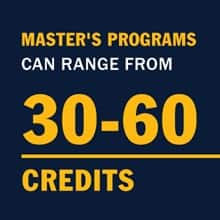How to Get a Master’s Degree

Understanding the numbers
When reviewing job growth and salary information, it’s important to remember that actual numbers can vary due to many different factors—like years of experience in the role, industry of employment, geographic location, worker skill and economic conditions. Cited projections are based on Bureau of Labor Statistics data, not on SNHU graduate outcomes, and do not guarantee actual salary or job growth.
If you hope to advance in your field or launch a new career, you may be thinking about getting a master’s degree — and whether graduate school is right for you.
Earning a graduate degree can have many positive benefits for your career and long-term salary potential as the number of jobs that look for master’s degree-holders grows across many in-demand fields.*

“A lot more jobs are requiring master’s degrees,” said Jan Martin '23G, an undergraduate academic advisor at Southern New Hampshire University (SNHU). “I’m getting a lot of feedback from students who say they want to move up in their career but can’t go higher until they have a master’s degree.”
She can relate to this. In addition to her current role as an advisor, Martin has worked in freelance graphic design and real estate. She plans on leveraging her master's in communication to also become an adjunct instructor.
If you’re planning for your future career and wondering if you should go to grad school, begin to explore master’s degree requirements for admission and graduation to fully understand the potential benefits of a master's degree.
Is a Master’s Degree Worth It?
The answer to this question is subjective, but many master's degree holders find it to be worth it. Here's what a few of them had to say:

"It was well worth it," Jaiwaun Haggerty '25G said at Commencement after earning a master's in sports management." It was time-consuming, but with the help of my advisor and my family and the support of my jobs, it definitely is a sigh of relief to be here."
Haggerty said his advisor helped him stay on track while earning his degree. “He gave me a call every other week to just check in," Haggerty said. "He definitely helped me in a huge way.”
After graduating from his bachelor's program during the COVID-19 pandemic, he was especially excited to celebrate his master's at the SNHU Arena. "The last time I was able to walk was high school, and that's nearly 18 years ago," Haggerty said. "It feels amazing."

Jessica Yonice Vazquez '24G decided to earn her master's degree in human resource management from SNHU for her family.
"My overall goal was just to make sure that I was able to provide a future — a better future than I ever had — for my daughter as a single mother," Vazquez said. "Something about SNHU just felt very much like home."
Although her courses have already benefited her in her current role, now that she's graduated she said she's excited to take the leap and change careers. "I do plan on applying my newly set skills to an HR department," she said.

For AnneMarie Kulis '20 '24G, continuing on with a master's in healthcare administration after she finished her bachelor's at SNHU just seemed to make sense.
"The price was very reasonable, and for my bachelor's, they transferred a lot of credits in for me," Kulis said. "So continuing on to my master's was just very easy."
While reflecting at Commencement, she was especially struck by how much confidence she gained during her master's program.
"I have confidence in having the knowledge to back up what I'm saying when I'm doing my job," she said. "It was definitely worth it."
Learn more about if a master's degree will be worth it for you.
Are Master’s Degrees in Demand?
Master’s degrees are in high demand across a variety of industries, according to the National Center of Education Statistics (NCES).* Between 2011 and 2022, the total number of master’s degrees conferred increased by 16%, up to 880,200 master’s degrees in the 2021-22 academic year, according to the NCES.
Based on the NCES report, the majority of those degrees were awarded in:
- Business
- Education
- Health professions
Businesses, too, are seeking master’s degree holders at higher rates, according to information from the U.S. Bureau of Labor Statistics (BLS).* Through 2033, jobs typically requiring a master’s degree are projected to grow 12.1%, compared to 7.2% for jobs requiring a bachelor’s degree and 2.5% for jobs requiring only a high school diploma, BLS reported.*
One benefit of earning a master's degree is that it may open the door for potential job opportunities that may require a higher level of education, Martin said. No matter what your career goals are, a master’s degree can also boost your earning potential and reduce your risk of unemployment throughout your career.*
In 2024, master’s degree holders’ median weekly earnings were about 19% higher than bachelor’s degree holders and 67% higher than associate degree holders, according to BLS data.*
Master’s degree holders also had a 2.2% unemployment rate in 2024, compared to 2.5% for bachelor’s degree holders, 2.8% for associate degree holders and 4.2% for workers without any college education, according to BLS.*
Ready to see yourself succeed in a master's degree program? The first step is to find the degree that fits your needs.
Choosing a Master’s Degree
If you want to earn a master’s degree but are wondering, “What master’s degree should I get?” start by considering what you hope to achieve with your degree and make a list of master’s degree options, Martin said.
Think about the field in which you want to work, the tasks you'd like to do on a day-to-day basis and the environment you'd enjoy the most. Do you see yourself working at a computer, or would you rather be out in the field? Do you want to manage employee and client relationships, or would you rather stay behind the scenes?
“Knowing what kind of skills you’re looking to obtain can help your advisors point you in the right direction,” Martin said.
Different types of master's degrees include:
- Master of Science (MS)
- Master of Arts (MA)
- Master of Fine Art (MFA)
- Master of Business Administration (MBA)
- Master of Education (MEd)
- Master of Science in Nursing (MSN)
- Master of Public Health (MPH)
It’s important to ensure that the master’s degree program you enroll in is right for you and will fulfill any educational requirements for the career you want, particularly if you'll need to seek state licensure or certification, Martin said.
If you want to advance an accounting career or become a CPA, for example, you'll want to ensure that your accounting master's degree aligns with your state's education and licensing requirements to sit for the CPA exam.
Check out more tips to help you choose a graduate program.

Can You Get a Master’s Degree Online?
When choosing a master’s degree program, consider how your graduate education will fit into your life, particularly if you’re balancing coursework with a career and family obligations.
Luckily, there are many options for online master’s degree programs, which can give you 24/7 access to video lessons, reading materials and other educational resources so you can learn at the time that works best for you.

“Getting a master’s degree online makes it attainable for so many people who maybe wouldn’t have the option to do so otherwise,” said Natasha Dominguez, a graduate admission counselor for SNHU. “An online program also gives you more freedom to schedule coursework around your busy life and really take control of that balance of work, life and family.”
Dominguez has been an admission counselor for over 8 years and also owns her own small business. She earned a graduate marketing certificate online from SNHU to allow her to better understand online graduate coursework from a student perspective and market her business.
"Not only are you saving time and money by not having to commute to and from a physical campus, but your geographic location is no longer a barrier," Dominguez said. "With an asynchronous online program, you are not required to attend class at specific times."
This online format can allow you to complete your assignments at a time that makes the most sense for you.
Discover these 6 good reasons to get a master's degree online.
Find Your Program
Applying to a Master’s Program
Specific master’s degree requirements for admission vary among universities and degree topics, but the process typically begins by filling out an application for enrollment.
Once you’ve applied, an admission counselor can help you through the rest of the acceptance process, Martin said. If you’re still unsure about which degree program is right for you, an admission counselor can help you talk through your goals and find the best fit.
Admission counselors can also help you determine if any standardized testing is required for admission. While some graduate schools require standardized testing like the GRE or GMAT, many online programs don’t require any such assessments, Dominguez said.
Before being admitted into a master's degree program, you’ll also need to demonstrate that you’ve already earned a bachelor’s degree. While an official transcript will need to be requested from your undergraduate program, having an unofficial record of your college education, such as a copy of your transcript or even a diploma, can help keep the application process moving forward while you wait for the official record, Dominguez said.
Be sure to review your past educational and professional experience with your admission counselor, too.
If you’re applying to a master’s degree in a new field, you may need to take some foundational courses to get you up to speed on the subject before enrolling. But if you’ve already completed some graduate-level coursework or have certain types of relevant professional experience, you may be able to apply that learning to your program to save time and reduce the cost of a master’s degree.
Additional admission requirements can vary by program, Martin said. A business master’s degree program might require a professional resume, for example, and a creative writing program may require a writing sample.
Common Questions About Earning a Master’s Degree
Applying for a master's program is only the beginning. Review potential requirements needed for graduation, the length of time it may take to get you there and more.
How Many Credits for a Master’s Degree?

Master's programs can range from 30-60 credits, though exact credit requirements can vary between programs.
In addition to regular coursework, some master’s degree programs may require an internship, clinical fieldwork or other hands-on learning activities. A capstone project that uses all of the learning within a program to solve a real-world problem may also be a requirement for earning your degree.
"A capstone course is a culmination of your program. It encompasses what you learned and allows you to implement that into a final project that you work on during the duration of the course," Martin said.
Some master's programs may require a thesis instead of a capstone. "In a traditional sense, a thesis is a long scholarly paper," Dominguez said. "A capstone project differs from a thesis as it can be a project other than a traditional research paper that demonstrates what you have learned, depending on your program."
According to Dominguez, capstones can be a portfolio of work or a reflective essay versus a traditional research paper.
How Long Does It Take to Get a Master’s Degree?
How fast you complete a master’s degree depends on the program you’re enrolled in and the time available in your schedule.
Earning a master’s degree online can help you earn your degree faster, allowing you to keep learning even during the summer and winter holiday seasons when on-campus classes are typically not in session.
You may be able to complete an online master’s degree program in as little as 15 months. But if you're balancing work and family responsibilities, you may need to take fewer courses each term or even take a term off, and it may take longer to earn your degree, Dominguez said.
Keep reading about how long a master's degree can take.
What is the Cost of a Master’s Degree?
The cost of a master’s degree varies based on the specific program you enroll in, the textbooks and other materials required for your courses and the tuition rates of your university.
Earning a master’s degree online instead of on campus can help reduce overall costs, by saving time and reducing expenses for room and board, student services and other fees. Online courses also typically use more free or lower-cost learning resources, like video tutorials and e-books.
Martin said that some employers may even offer special incentives, such as tuition reimbursement, which could help reduce your out-of-pocket costs.
Learn more about how to pay for a master's degree.
See Yourself Succeed With a Master’s Degree
When it comes to graduating with a master’s degree, planning and preparation are key, particularly if you’ll be learning while balancing a career and family.
Setting yourself up for success can start as soon as you’re admitted to a graduate program by reviewing your schedule and determining how you’ll fit your coursework into your daily life.
“It’s important to make a time management plan when you’re going back to school,” Dominguez said. “At the very least, make note of when you will have free time in your schedule. Find a specific area in your home to go study, too, which can really help improve your focus.”
As you prepare for your transition into a master's program, discover what it's like to be a graduate student.
You can also explore other learning resources available to students from your university, Martin said. Many master's degree programs offer student services like virtual tutoring, writing assistance and even career guidance.
The most important factor for master’s degree success, however, Martin said, is to simply never give up.
“Just continue to have that faith and believe in yourself, and have that good attitude as you’re working through your program,” she said.
A degree can change your life. Find the SNHU master's degree that can best help you meet your goals.
*Cited job growth projections may not reflect local and/or short-term economic or job conditions and do not guarantee actual job growth. Actual salaries and/or earning potential may be the result of a combination of factors including, but not limited to: years of experience, industry of employment, geographic location, and worker skill.
Danielle Gagnon is a freelance writer focused on higher education. She started her career working as an education reporter for a daily newspaper in New Hampshire, where she reported on local schools and education policy. Gagnon served as the communications manager for a private school in Boston, MA before later starting her freelance writing career. Today, she continues to share her passion for education as a writer for Southern New Hampshire University. Connect with her on LinkedIn.
Explore more content like this article

AI in Education: How Technology is Shaping the Future of Learning

Associate Degree vs. Bachelor's Degree: What's the Difference?

How to Get a Scholarship (And Why It Matters If You Do)
About Southern New Hampshire University

SNHU is a nonprofit, accredited university with a mission to make high-quality education more accessible and affordable for everyone.
Founded in 1932, and online since 1995, we’ve helped countless students reach their goals with flexible, career-focused programs. Our 300-acre campus in Manchester, NH is home to over 3,000 students, and we serve over 135,000 students online. Visit our about SNHU page to learn more about our mission, accreditations, leadership team, national recognitions and awards.


